December 30, 2023
Naja, the last captive orca in Russia, recently gave birth to a healthy female calf at Moskvarium. Despite being a first-time mother, Naja has shown attentiveness and care toward her newborn, and the pair are still together.
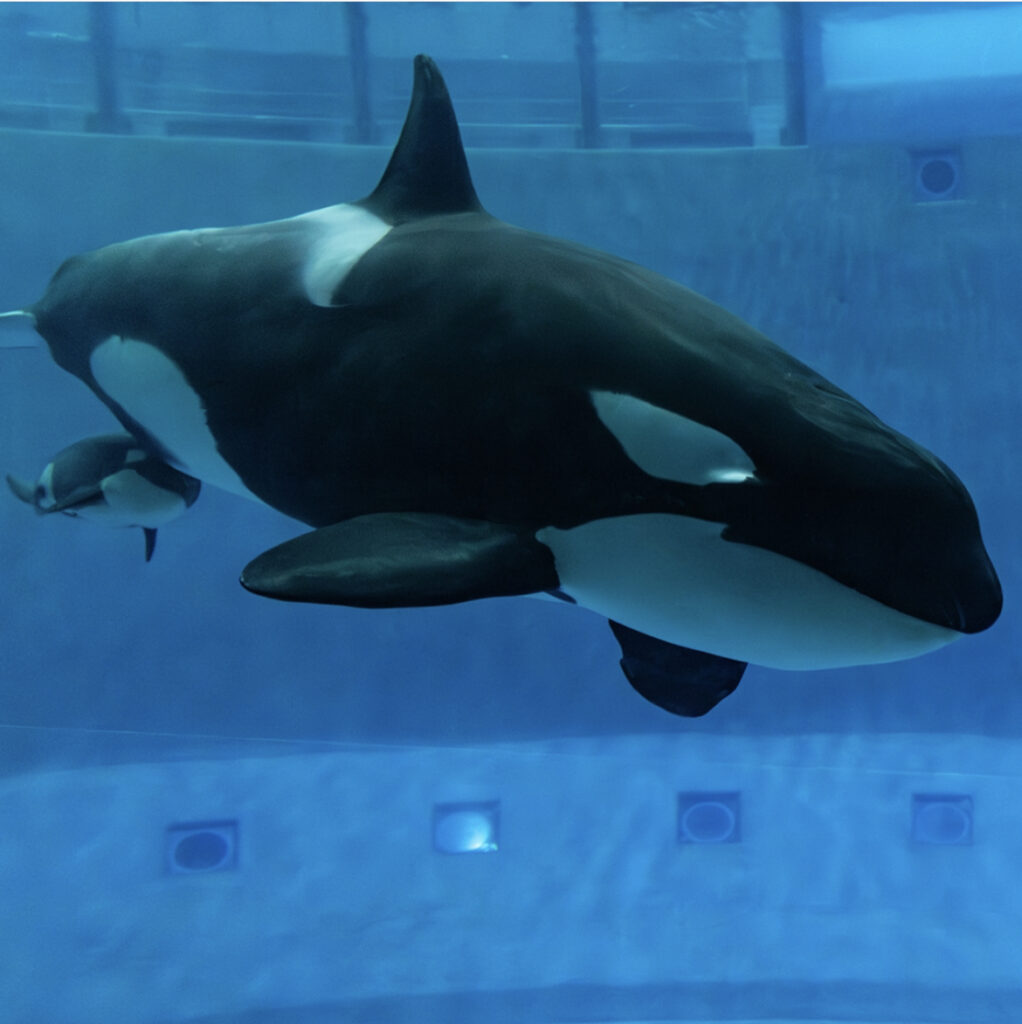
Photo by Moskvarium
The labor was challenging, lasting approximately 10 hours, and there were initial concerns that the calf might not survive. Fortunately, both mother and calf are doing well, though they will need time to recover. To ensure privacy and a peaceful environment, they will remain out of public view for the time being.
The news of Naja’s pregnancy had raised significant concerns. In the wild, older, more experienced female orcas usually help first-time mothers with calf-rearing. Without such support, and with no pod to rely on, the challenges for Naja are heightened. Many captive orcas in similar situations have rejected or even harmed their calves. While Naja has accepted her calf, the journey ahead will be difficult, and her ability to care for her baby independently will be tested. Hopefully, Naja can recover quickly and continue to bond with and raise her calf.
December 28, 2023
Chimelong Ocean Kingdom (COK) has announced the birth of a male orca calf, Wulong, on December 1st, 2023. The calf, whose name means “black dragon,” is reported to be in good health.
(Note: as of 2024, Wulong given his official name Bowen).
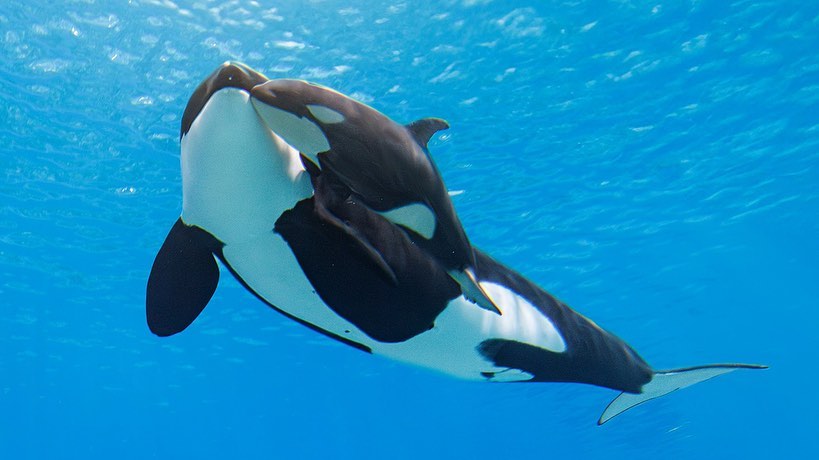
Photo by Chimelong Ocean Kingdom
This marks Katenka’s third calf in just four years. Her first, Yilong, was born on April 5th, 2019, followed by her second, Katniss, on January 27th, 2022. The rapid frequency of reproduction raises significant concerns, as wild orcas typically have a calving interval of 3-5 years. Such a short span between births could cause physical harm to Katenka’s body, highlighting the lack of responsible breeding practices at COK.
Moreover, while COK has publicly acknowledged four orca calves, there are reports of a fifth calf, whose whereabouts remain unknown—whether deceased or hidden in an undisclosed location.
December 21, 2023
Dora, a wild-caught female orca at Shanghai Haichang Ocean Park, has given birth to her first calf. However, details about the calf—such as its health status, birth date, and father—remain unknown at this time.
Currently, the calf is in the medical pool, separated from Dora, and being hand-reared by trainers. The reason for this separation is not confirmed, but it is not surprising. In the wild, orcas typically have their first calf around 14 years old, and mothers often receive support from older, more experienced female orcas. Dora, at approximately 12 years old, lacks this crucial support system, having been captured from the wild at just 4 years old. She was brutally separated from her own mother and now suffers from being segregated from her child.
November 27, 2023
In a hopeful development, Moskvarium, located in Moscow, Russia, is considering retiring Naja, the last captive orca in the country, to a sea-pen. This comes just weeks after the announcement that Naja is pregnant and due to give birth this December.
Naja, estimated to be 11 years old, was captured from the Sea of Okhotsk in 2014 and has lived at Moskvarium since December of that year, alongside fellow wild-caught orcas Narnia and Nord. Tragically, both of her tankmates passed away earlier this year—Narnia in January from intestinal volvulus and Nord, the father of Naja’s calf, in June from an acute peptic ulcer. Since Nord’s passing, Naja has been in isolation from other orcas.
Details about the potential sea-pen retirement remain unclear, with the location and timing likely contingent on the birth and survival of Naja’s calf. Whether Naja will accept her calf and how it fares could play a significant role in determining the conditions for her move to a sea-pen.
November 6, 2023
Miami Seaquarium handed notice of default.
In response to the violations highlighted by the July 2023 USDA report, the Miami Dade County has issued a notice of default to the Miami Seaquarium (MSQ). MSQ has 45 days to fix the violations outlined in the USDA report.
The report found numerous violations in relation to maintaining veterinary equipment and providing veterinary care, maintaining suitable veterinary staffing levels, and providing safe enclosures for animals and ensuring they were in good repair.
Notably:
– A pacific white sided dolphin was found to have ingested numerous foreign objects including a zip tie, cement, and broken plastic.
– A manatee was left without any protection from direct sunlight for several consecutive days.
– A bottlenose dolphin was found to have suffered multiple rib fractures as a result of aggression from tank mates.
By violating animal welfare standards, MSQ are also in violation of their landlord agreement with Miami Dade County as this stipulates that the park must adhere to federal regulations including the Marine Mammal Protection Act and Animal Welfare Act.
A spokesperson for Miami Dade County also stated that “the county is actively exploring any alternative options that may be available within the boundaries of the law”. It is unclear at this stage what is meant by this.
Failure to remediate the violations within the 45 day timeframe could result in termination of MSQ’s lease. MSQ has yet to publicly respond.
October 18, 2023
Moana, a 12-year-old captive orca at Marineland Antibes, tragically passed away last night. The facility has described his death as “sudden and unexpected.”
Born on March 16, 2011, to first-time mother Wikie, Moana made history as the first orca in France to be born via artificial insemination. He spent his entire life at Marineland, where he formed close bonds with his mother, Wikie, his younger brother Keijo, and his uncle Inouk.
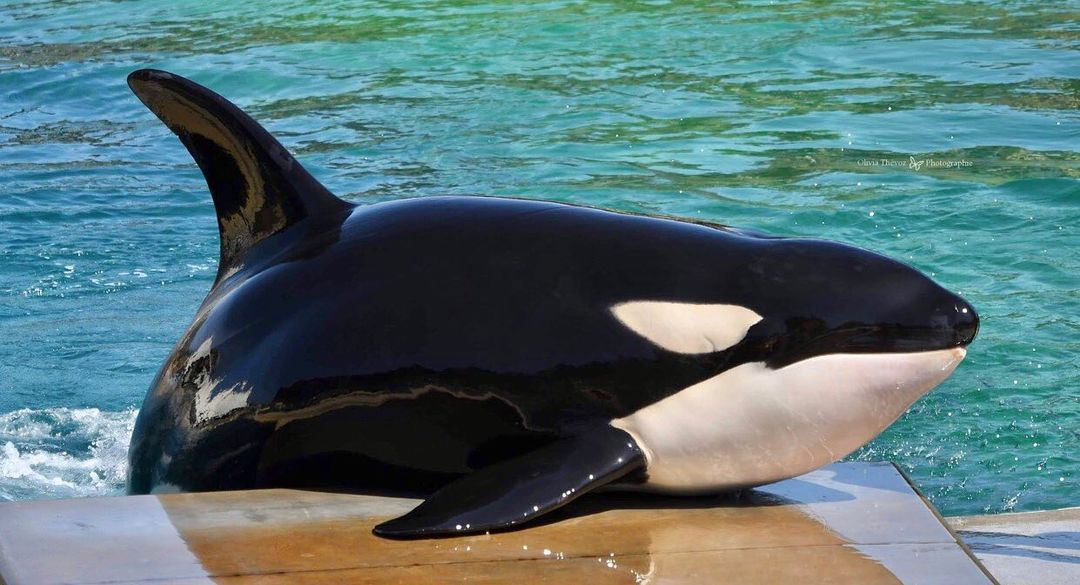
Photo by @petite_photographe_animaliere (IG)
Moana’s life had been marked by controversy in recent years due to recurring skin discoloration around his lower jaw, though it remains unclear whether this played a role in his sudden death.
Insider sources and French activist groups have raised concerns that Marineland plans to sell and transfer its orcas to a facility in Japan, though it is uncertain if Moana’s death will affect these plans.
At just 12 years old, Moana was far too young to die. Wild male orcas typically reach sexual maturity between 12-15 years and live to an average age of 30, with some reaching up to 60 years. Unfortunately, premature deaths are all too common in captivity, with only four captive orcas reaching their average life expectancy before passing.
October 17, 2023
Naja, the last captive orca in Russia, is currently 15 months into her pregnancy, with a due date in late December. This marks her first pregnancy, and it is also the first for Moskvarium, the facility where she resides.
However, concerns are mounting over Naja’s ability to properly care for her calf. Orcas, highly social animals, rely on the support of pod mates, especially older females, during the birthing process and in raising their young. Tragically, Naja lost her two tankmates earlier this year—Narnia, who acted as a surrogate older sister, died in January, and Nord, the calf’s sire, passed away in June. Without the support of experienced pod members, Naja faces a high risk of rejecting or even attacking her newborn calf, a tragic scenario that has occurred with other inexperienced captive orcas.
October 7, 2023
The tragic final hours of Tokitae’s life have been brought to light.
*Contains graphic details*
On 15th August, Tokitae (AKA Sk’aliCh’elh-tenaut/ Lolita) started exhibiting signs of discomfort and stopped eating. It was decided on August 18th that Toki would be moved to the medical pool and the water dropped so blood could be drawn and medication and fluids administered.
On the day, one of the bulkheads (responsible for water level management) was leaking and staff were fearful the water would drain too slowly and rush back up too quickly. This is dangerous as cetaceans don’t breathe automatically, it is a conscious decision, if they lose consciousness, they can drown/suffocate.
After the medication was given and the water started to rise, Toki began to flounder and struggled to hold herself upright. Part of her tail was limp and she started to bleed from the mouth. Trainers rushed to her aid but she wasn’t responsive for several minutes.
The water was re lowered and her stretcher used to support her. Her breathing became irregular and she did not recover, dying later that same day.
Toki’s former Vet, Michelle Rodriquez, says medical examiners should be “highly suspicious” that the procedure happened just before her death. She suggests that an investigation into Toki’s death should include a pharmacology panel to determine the level of medications given, including the potential use of sedatives. Further- that bleeding from the mouth could indicate a hemorrhage or adverse reaction to medication. Toki’s Vet at the time, Tom Reidarson, has been asked to comment on the medication given but has not responded.
In statements following Toki’s death, the Miami Seaquarium (MSQ) have insisted they will share the cause of death following the conclusion of her necropsy. They have yet to release this. On September 14th, NOAA fisheries received the cause of Toki’s death from MSQ but not the report. MSQ are not legally required to provide this as Toki was not covered by either the MMPA (she was captured before the act) or AWA (USDA removed her from MSQ’s exhibition license in March 2022).
Source: Miami New Times
September 21, 2023
After 53 years in captivity Tokitae, aka Lolita, is finally going home 🤍
According to the Lummi Nation, its members traveled to Athens, Georgia, earlier this week to culturally and traditionally prepare Toki’s ashes for her journey home. A necropsy was conducted in August by vets and pathologists at the University of Georgia.
“This week’s ceremonies are private for Sk’aliCh’elh-tenaut’s Lummi relations. Sk’aliCh’elh-tenaut will be honored with a public celebration of life at a date to be announced later,” the Lummi Nation said.
Wednesday: Toki’s ashes are set to arrive at Bellingham International Airport. The arrival is closed to the public and media.
Saturday, Sept. 23: Lummi Nation police plan to escort Tokitae’s ashes to Fisherman’s Cove in Bellingham. Tokitae’s ashes will be taken by boat to a sacred spot to be spread in a traditional water ceremony. “The Coast Guard will be present to ensure there is no interference,” the group said. This, too, will be closed to the public and media. “There will be a public honoring and celebration of Sk’aliCh’elh-tenaut’s life at a time and place to be announced at a later date,” Lummi Nation said in a statement.
Howard Cohen – Miami Herald – @untillolitaishome
August 30, 2023
Insider sources have confirmed that the transfer of Marineland Antibes’ orcas is scheduled to take place during their upcoming winter closure period, January-February 2024. This has also been confirmed by the airline proving transportation. Wikie, Inouk, Moana, and Keijo, are likely being exported to Japan where they will be distributed amongst three parks:
– Kamogawa SeaWorld – Home to 4 female orcas: Ran, Lovey, Lara, and Luna
– Port Of Nagoya Aquarium – Home to 2 females orcas and 1 male: Stella, Lyn, and Earth
– Kobe Suma SeaWorld
Kobe Suma SeaWorld is not yet operational but is in development by the Granvista group, who also own Kamogawa SeaWorld. Public access to the orca stadium will be restricted to weekends only from September 2023 onwards in order to allow staff to prepare the orcas for transfer. All MLA’s orcas were born at the park and have never undergone transport before.
Local activist groups within France such as @cest.assez.association are seeking legal means to prevent the transfers as well as appealing to the government for support. MLA have yet to obtain permits so it is hoped that, with enough public pressure, MLA’s decision can be reversed or the permits refused.
August 19, 2023
Tokitae, also known as Lolita, has tragically passed away at the age of 59. Miami Seaquarium reported that her health began to deteriorate on August 16, and despite the best efforts of her veterinary team, she died two days later. A renal condition is suspected to have caused her death.
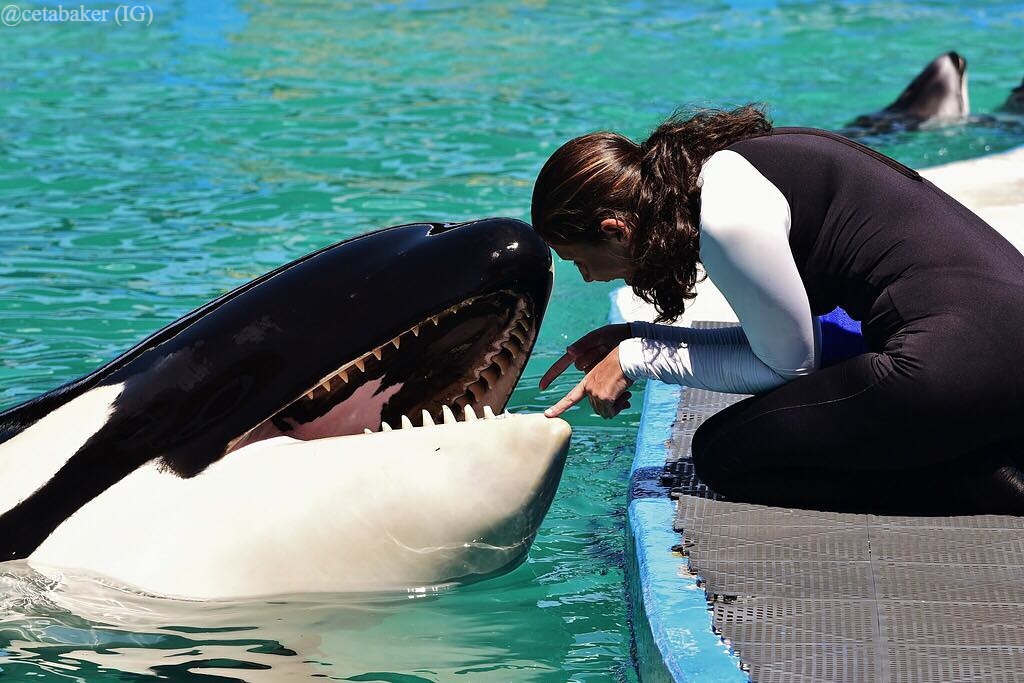
Photo by @cetabaker (IG)
Tokitae was the last wild-caught Southern Resident killer whale in captivity. She was captured from Penn Cove, Washington on August 8, 1970, at just 4 years old. Soon after, she was sold to Miami Seaquarium, where she was introduced to Hugo, another Southern Resident orca captured two years earlier. The pair bonded and spent nearly a decade together until tragedy struck in 1980 when Hugo died of a brain aneurysm.
After Hugo’s death, Tokitae was left without the companionship of her species for over 40 years, confined to the smallest orca tank in the world, which was not only inadequate but also illegal under the Animal Welfare Act. The tank provided minimal protection from the elements, contributing to Tokitae’s vision loss, sunburns, and recurrent infections. Over the years, Miami Seaquarium faced multiple animal welfare violations, with reports in 2021 revealing that Tokitae was underfed and given poor-quality fish.
In March 2022, Tokitae was retired from public performances, and a year later, Miami Seaquarium, alongside Friends of Lolita, announced plans to move her to a sea-pen in the waters where she was originally captured. Unfortunately, these efforts came too late, and Tokitae’s life was marked by decades of suffering, exploitation, and isolation.
Tokitae, known as Sk’aliCh’elh-tenaut by the Lummi Nation, has now passed. May she rest in peace.
August 5, 2023
Devastating news from France.
Marineland Antibes’ (MA) plans to export their orcas to another marine park, have been confirmed. It is unknown which park/s the orcas are being sold to, though in May rumours began circulating that MA’s 4 orcas will be transferred to Suma Sea World Park in Japan in 2024.
The Antibes orcas have lived together their entire lives. Wikie lives with both her sons, Moana and Keijo, and her half brother, Inouk. Despite this, it’s likely the group will be separated for breeding purposes and due to space restrictions. Whilst separations are common in captivity, wild fish eating orca populations typically live in fixed matriarchal family groups that stay together for life.
Being a proven breeder, Wikie would be very valuable to a marine park such as Loro Parque, Spain, that has only one female orca. In Japan, there is only one male orca and artificial insemination has proved unsuccessful, making the 3 Antibes males potentially valuable assets.
At 11 million gallons, the MA orca tank is the largest in the world. Any tank the Antibes orcas are transferred to will certainly be smaller and more crowded.
The orcas have never been separated or transported before so it’s unknown how they will adapt to the dramatic change. Of particular concern is Inouk, who MA have previously admitted is “often sick, due to aggressions of other animals” and oral infections, caused by his teeth being worn down through stereotyped behaviours including biting concrete and regurgitating.
In November 2021, an act was promulgated in France that bans the breeding of cetaceans (except for research and conservation) and recommends keeping them in sanctuaries. The act is sadly unenforceable due to a lack of clarification on breeding exemptions and sanctuary definitions.
Under the act, there is NO REQUIREMENT to sell or move existing cetaceans. The responsibility for the bleak fate of MA’s orcas lies solely with them.
July 30, 2023
These videos, taken recently by @/proyectogalgoargentina, show 34-year-old orca Kshamenk looking extremely emaciated. His ribs are visible, he has a ‘peanut head’ (indentation behind the blow hole), indentations on either side of his head (outlining his skull) and his peduncle region. Reports of his weight loss have been circulating since September 2022.
He no longer performs high energy behaviours during shows and sometimes refuses commands. Despite having very little blubber to protect his skeleton and organs, he is still required to present on slide outs and wave to crowds. Outside of the shows he logs motionless for hours in the back pools. As of writing, Mundo Marino have not provided an explanation for his condition.
Despite collecting 24 samples of sperm from Kshamenk in 2010, resulting in two viable calves, SeaWorld have consistently failed to provide assistance to Kshamenk or improve his living conditions. Even now, as his health rapidly declines, they remain silent.
Local activist groups presented bill 1577/22, nicknamed ‘Kshamenk law’, to the government of Argentina in July 2022. If passed, the bill would ban the captivity of cetaceans except for rescue/rehabilitation. It also requires current captives to be released or transferred to a sanctuary within two years of enactment. It is hoped Kshamenk could be retired to a sea sanctuary such as those being created by One Whale (Norway) or The Whale Sanctuary Project (Canada).
These sanctuaries are many years from being ready though, even if they were Kshamenk’s classification as ‘native fauna’ would complicate his export. In 2001, Six Flags attempted to import Kshamenk to the US. This was denied due to restrictions regarding exporting native fauna under Argentinian law.
There are serious welfare concerns for Kshamenk that @mundomarino.ar and the Government of Argentina are failing to address. Until they do, we can only hope that Kshamenk’s health improves and he lives long enough to experience retirement to a sanctuary or appropriate facility after 31 long years of suffering in confinement.
July 15, 2023
Cookie, a wild-caught female residing at Shanghai Haichang Ocean Park, has sadly lost her calf shortly after birth (due in late July/August). The cause of death is unknown at this time.
Had the calf lived, this would have been 11-year-old Cookie’s second calf in just 2 years. Whilst it does vary, generally wild orcas tend to have their first calf at 12-14 years old and the average viable calving interval is 5 years.
Cookie was captured in 2015 from the Okhotsk Sea in Russia at 3-years-old. She was then sold to Haichang Ocean Park where she was was joined by Dora, Sean (both captured 2015) and Fat Tiger (captured 2014).
Cookie’s first calf, Cody/Fat Beans, was born in September 2021. Some sources claim Cookie went into labour during a show. After birth, Cody allegedly appeared agitated by the onlookers and collided into the tank’s glass wall. Cookie rejected him and he was unable to nurse so staff stepped in to rear him.
Calf rejections are fairly common in captivity, the exact cause is not known but it is theorised to be caused by the immaturity of mothers (average calving age in captivity is 11 years but breeding can happen as young as 7) and lack of parental role models due to the frequency of mother-calf separations at a young age.
Cody has never been placed in the same tank as his mother since, or allowed to interact with any of the other pod members. They only socialise with him from behind the gates separating them. He spends his days circling a tiny back pool with only his toys and the trainers for companionship. There are already plans for him to be sent to another facility- Zengzhou Haichang. Orcas are highly social beings with complex cultures, to be raised in social isolation is extremely unnatural and detrimental to Cody’s development.
Cookie’s calving tragedies are a sad reminder of the difficulty of captive breeding. Whilst a life in captivity is a dire fate for any newborn orca, the loss of Cookie’s calf is immensely tragic. We hope that she is not subjected to further irresponsible breeding by Haichang Ocean Park and is able to recover from her loss.
July 5, 2023
Shanghai Haichang Ocean Park has confirmed that Cookie, a wild-caught orca, is pregnant and expected to give birth within the coming month. The China Cetacean Alliance (CCA) first became aware of Cookie’s pregnancy in early 2022, raising significant concerns about her health and the well-being of the calf.
Cookie’s situation is unusual and troubling for several reasons. In the wild, female orcas typically have calves every 4-8 years, allowing ample time to recover between pregnancies. Cookie’s first calf, Cody (nicknamed “Fat Beans”), was born in September 2021 and is not yet 22 months old. This suggests that Cookie became pregnant again just four months postpartum, a timeline far shorter than what is natural for orcas.
Compounding concerns, Cookie is estimated to be only 10 years old, while wild female orcas generally have their first calves between the ages of 12 and 14. The strain of back-to-back pregnancies at such a young age could pose serious risks to her health.
The most heartrending aspect of this pregnancy is the likelihood that Cookie will reject the calf. Cookie rejected Cody at birth, likely due to her lack of maternal experience. Captured from the wild at around four years old, Cookie was separated from her mother and deprived of the generational knowledge that orcas use to rear their young. Without older female orcas to guide her, it is highly probable that this calf will also be abandoned and require human intervention to survive.
June 23, 2023
Moskvarium has confirmed the death of Nord, a 14-year-old male orca, citing an acute peptic ulcer as the cause.
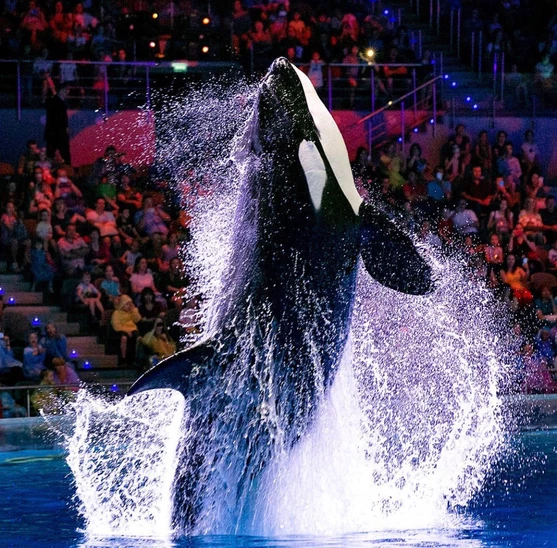
Photo by Moskvarium
Nord’s life began in the wild waters of the Sea of Okhotsk, Russia, where he thrived within a family pod. However, this came to an abrupt end on August 13, 2013, when Nord, then approximately five years old, and two other young orcas were captured. They were taken to the TINRO adoption center, where they were trained to perform tricks and eat dead fish—a stark departure from their natural behaviour as transient orcas that hunt marine mammals.
In December 2013, Nord was transported to Moscow alongside Narnia, another wild-caught orca captured the year prior. They were housed in a temporary holding facility before being moved to Moskvarium in 2014. There, they were joined by Naja, another young orca taken from the wild. Despite the companionship, life in captivity took its toll. Narnia passed away in January 2023 at the age of 16, and now, just six months later, Nord has followed.
Wild male orcas typically live an average of 30 years, with females reaching 50 or more. Neither Nord nor Narnia lived to even half these averages.
Nord’s death leaves Naja, now 12 years old, as the sole orca at Moskvarium and the only captive orca in Russia. Orcas are highly social animals with complex emotional needs, and prolonged isolation could pose a significant threat to Naja’s well-being. Moskvarium has not yet announced any plans for her future.
June 2, 2023
Rumors have surfaced that Marineland Antibes’ four orcas—Wikie, Moana, Keijo, and Inouk—may be transferred to Suma Aqualife Park in Japan in 2024. While no official statement has been issued, Marineland reportedly responded to inquiries with, “We can neither confirm nor deny.”
According to an alleged trainer’s disclosure to a visitor, preparations for the transfer are underway, including measurements of the orcas for transportation. Additionally, it is rumored that Wikie, the sole female, has been taken off contraceptives. French animal rights organizations have since received purported evidence supporting the claims and are already opposing the move.
Marineland Antibes houses its orcas in an 11-million-gallon tank, the largest in the world. In stark contrast, Suma’s facilities are significantly smaller and are expected to hold orcas from other Japanese parks. If transferred, Wikie and her family—one of the few intact orca groups in captivity—could face separation, likely for breeding purposes. Japan’s aquariums have been actively seeking to diversify the genetic pool of their captive orca population, with prior efforts including artificial breeding programs using wild-caught orcas.
In 2021, France passed legislation banning captive cetacean breeding except for research and conservation purposes, encouraging sanctuaries for existing animals. However, the law lacks enforceable guidelines, leaving facilities like Marineland under little obligation to comply.
Reports suggest Marineland has faced financial struggles in recent years. Selling the orcas to Japan would be a financially driven decision but raises serious ethical concerns about the welfare of the animals. Advocacy groups continue to call for transparency and a focus on the orcas’ well-being over profit.
May 30, 2023
Last week on Local 10 news, a series of exclusive reports were run on Toki’s current condition and journey home.
Summary below:
Toki’s health:
– MSQ Vet Jessica Comolli says Toki has ‘great energy’, that ‘her blood work is stable’ and she’s ‘looking really good’
– MSQ Owner Eduardo Albor assured that Toki is in ‘good condition for transportation’ and could do the move ‘right now’
– It was mentioned that during hurricane season, Toki will not be abandoned and attempts will be made to secure the stadium
– Albor admitted that her tank requires repairs but these could only be done if it was emptied and Toki removed. Later, he stated that the tank ‘has to go’ and it is ‘bulldozer time’
– More than half a million dollars has been invested on new tank upgrades to improve water quality
– The new ozone generator sterilizes whilst the new chilling system can reduce the temperature to 50 to prepare her for the waters of the Pacific Northwest
Toki’s journey:
– Toki’s interactions and exercise regime has increased and transportation stretcher training is due to start soon
– Federal and state regulatory agencies still need to grant approval which could take months/years
– The application process has already begun but there are other options available to her too
Option-SeaWorld:
– Toki could move to SeaWorld Orlando temporarily until her sea pen release. Albor says they have the expertise to care for Toki
– However, when approached for comment, a SeaWorld spokesperson responded ‘We have not had any conversations with the current owners of Miami Seaquarium about any potential involvement in Toki’s situation’
Option- Custom temporary tank:
– The third option involves building Toki a new temporary tank
– At this point, Jenna Wallace, a former MSQ Veterinarian, featured with this statement: ‘Whatever is the fastest and whatever is the best for her… If that is going to be, build a pool and let her have her period of rehab, I think that’s great…She just needs to get out’
NB: Information taken from Local10 reporting, including direct quotes. Commentary has been provided for context but all rights belong to Local10.
May 6, 2023
TOKITAE (AKA LOLITA) UPDATE: A newly released article by Themed Reality revealed that the tank and surrounding structure (known as Whale Bowl) which currently holds Tokitae the orca at Miami Seaquarium is unsafe and repeatedly falling into disrepair. The following below is a timeline of all the key findings and events:
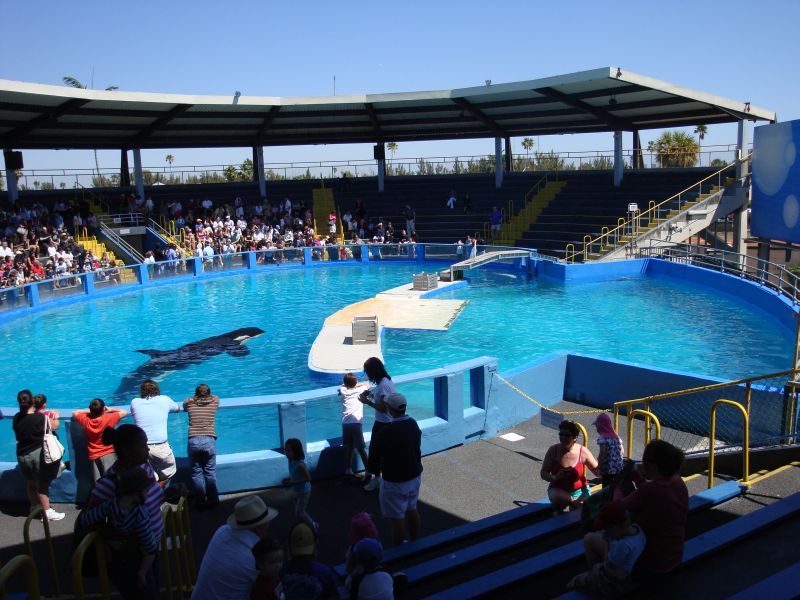
Photo provided by Niki Gianni.
June 8, 2021 – A USDA inspection found that a section of pool laminate on the slide-out area was missing, revealing cement. Blue paint on top of the walls was warped and flaking off. Large areas of drooping paint were observed with several pieces ending up in Toki’s tank.
Aug. 20, 2021 – An unsafe structures case opened.
Oct. 19, 2021 – Resolution on change of leases Infrastructure upgrades and repairs including: structural repairs, paint remediation and water filtration improvements to be complete by the end of 2021.
June 6, 2021 – Unsafe Structures Board hearing. Photos show significant structural damage; the area is shored off and stayed closed to the public.
June 22, 2022 – No construction can be performed due to health concerns for Toki. The stadium remained closed.
Aug. 23, 2022 – Shoring installed. Facility is safe for animal care and staff.
Sept. 21, 2022 – Unsafe Structures Board hearing
Lolita’s health deteriorated. No repairs can be made as any vibrations and debris would further affect her health.
Jan. 18, 2023 – The structure is safe for continued occupancy based on capacity (10 persons) but was evaluated as insufficient.
Apr. 21, 2023 – Shoring systems not meeting the min. requirements
In March 2023, The Dolphin Company and Friends of Lolita made a joint announcement that they would work together to retire Tokitae to a sea-pen. While the announcement was exciting, as of right now, Toki clearly needs more than just future promises. She should be removed from Whale Bowl immediately and taken somewhere safer where she can be prepped for life in a sea sanctuary. (@bornto.bewild / @untillolitaishome, Article: https://wp.me/p2bT7B-Wd)
April 8, 2023
SEAWORLD ORCA BITES TRAINER.
New government documents have revealed two troubling incidents that occurred at SeaWorld Orlando in 2022.
On June 15th, 15-year-old orca Malia bit down on a trainer’s wrist during a teeth/mouth cleaning session. Malia was signaled to go into the med-pool and to “chin up” so trainers could wash away paint chips and food debris. While using a pressurized water bottle the trainer moved their right arm across the plane of Malia’s mouth. It’s believed the water spray tickled Malia, causing her to close her mouth on the trainer’s arm. However, she let go once the trainer began resisting. The trainer had to undergo surgery to fix fractures in the forearm and wrist. The report concluded that the incident was likely not an act of aggression from Malia.
The second incident occurred during October at the facility’s Dolphin Cove. Rascal, a 25-year-old male bottlenose dolphin, sustained superficial rakes throughout a week-long period from his tankmates. As a result of the aggression, Rascal was left trembling and unwilling to lift his tail flukes. Overall, rake marks covered 30% of his body. Rascal was also unable to defend himself due to having worn down teeth. Just days later he would be attacked again and suffer new wounds. This time he was removed from the social group and two “problem” dolphins were identified and removed (@bornto.bewild).
March 30, 2023
MARVELOUS NEWS FOR TOKITAE/LOLITA!
The following press statement, issued this morning, is about the extraordinary collaboration between The Dolphin Company, which owns the Miami Seaquarium, and the non-profit organization Friends of Lolita in their effort to return Lolita, the orca also known as Tokitae, from the Miami Seaquarium to an ocean habitat in her home waters in the Pacific Northwest. The Whale Sanctuary Project’s executive director Charles Vinick is co-founder, with environmentalist and philanthropist Pritam Singh, of Friends of Lolita.
March 10, 2023
Kiska, the last captive orca in Canada and known as “the world’s loneliest orca,” has died at the age of 46. Marineland Ontario confirmed today that Kiska, who had been ill, passed away on March 9, 2023. Her death marks the end of orca captivity in Canada.
Captured off the coast of Iceland in October 1979 at approximately three years old, Kiska was purchased by Marineland shortly after and brought to Canada. Over the years, she gave birth to five calves—Unnamed Calf, Kanuck, Nova, Hudson, and Athena—between 1992 and 2004. Tragically, none survived beyond six years of age.
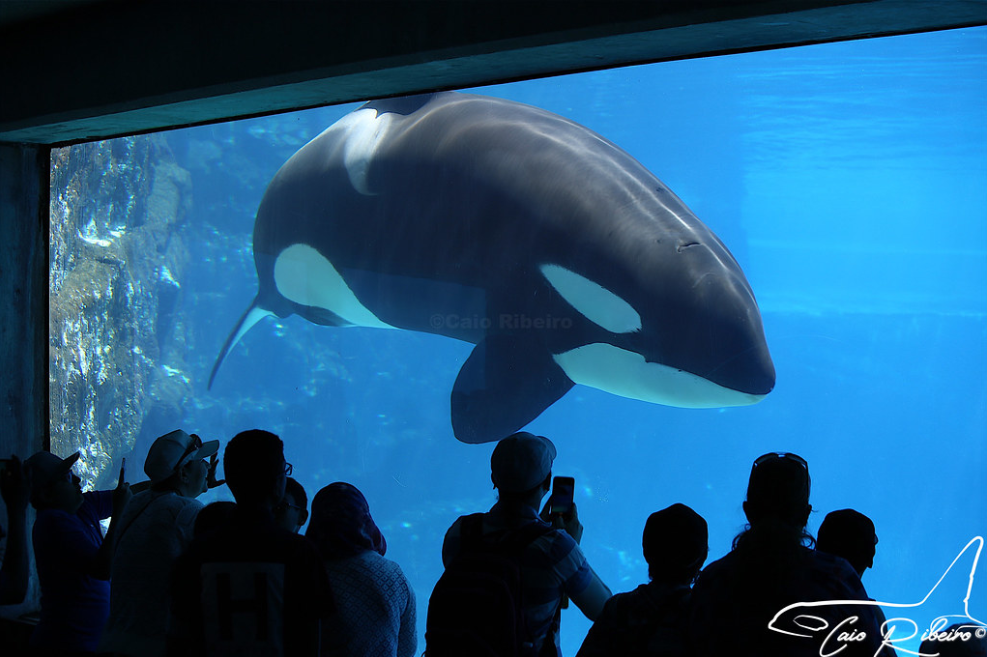
Photo provided by Caio Ribeiro.
Kiska’s last companion was Ikaika, an orca on loan from SeaWorld, who was removed from Marineland in 2011 following animal abuse allegations against the park. After his transfer, Kiska was left completely alone. For the past 11 years, she lived in isolation, a condition that drew widespread criticism from animal welfare advocates and marine mammal experts.
Her death comes nearly two years after the passing of 17-year-old Skyla at Loro Parque and adds to a growing list of orca deaths in captivity worldwide.
Rest in peace, Kiska.
February 24, 2023
Kiska, Marineland’s last-surviving killer whale, has been moved to the park’s medical pool amid concerns for her health. Captured from the wild in 1979, Kiska has spent over 40 years at Marineland Canada, swimming in circles and logging listlessly. She’s outlived all of Marineland’s orcas, including all five of her own calves, and has lived in solitary confinement since November 2011 when SeaWorld-owned orca Ikaika was taken back to the United States following welfare concerns.
Unlike other lone captive orcas like Tokitae at Miami Seaquarium and Kshamenk at Mundo Marino, Kiska is housed in complete social isolation with no animal companions to keep her company. Solitary confinement is considered to be a torture technique among humans due to our social nature. With the lives of orcas built around their interactions with their pod members, being forced to live alone must be a living hell for Kiska, who has nothing but harsh concrete walls and the debilitating feeling of loneliness to keep her company.
Her suffering is only worsened by the filth she’s forced to live in, with the accumulation of grime and faces clearly visible from above. No animal deserves to rot at the hell hole that is Marineland. Take a stand. Don’t buy a ticket.
February 11, 2023
Haichang Ocean Parks Holding has announced plans to transfer two orcas, Cody and Sean, from Shanghai Haichang Ocean Park to Zhengzhou Haichang Ocean Park. This development was reported by the China Cetacean Alliance (CCA).
Cody, also known as “Fat Beans,” was born on September 10, 2021, to Cookie and Fattiger. Due to a lack of maternal experience, Cookie abandoned Cody shortly after birth, leaving him to be hand-raised by staff. Sean, on the other hand, was captured from the wild in 2015 at approximately three years old. He was brought to Dalian Laohutan Ocean Park in 2016, where he joined Cookie, Fattiger, and another orca named Dora. All four were later transferred to Shanghai, where they have been performing in shows ever since.
The reasons behind the relocation of Cody and Sean remain unclear. However, speculation points to the unstable social dynamics within the pod at Shanghai. Sean, a younger and lower-ranking male, has reportedly been targeted by more dominant pod members. Cody, being even younger and more vulnerable, may also be at risk. It’s possible that concerns over his safety influenced the decision to move them to Zhengzhou.
January 26, 2023
Alarming reports have surfaced about Kshamenk, the only captive orca in Argentina, who resides in a concrete tank at Mundo Marino alongside several dolphins. Recent photos and videos reveal that Kshamenk appears dangerously underweight, sparking widespread public concern. In response, Mundo Marino issued a statement asserting that the orca is healthy and has maintained a stable weight for years.
Despite these assurances, multiple anonymous sources have presented a different explanation. They claim Kshamenk’s emaciated condition is not due to illness but a lack of adequate food. Argentina’s prolonged economic crisis has significantly affected Mundo Marino’s finances. During the COVID-19 pandemic in 2020, the marine park sought government assistance but was denied. As a result, Kshamenk’s food rations were reduced to cut costs.
While feeding routines reportedly returned to normal when COVID-19 restrictions eased, financial instability at Mundo Marino appears to persist. Since mid-2022, Kshamenk has shown signs of malnourishment, suggesting ongoing struggles to maintain proper care for the park’s animals.
Kshamenk’s condition highlights the challenges of captivity, particularly during financial crises, and raises urgent questions about the ethics and sustainability of keeping marine mammals in such environments.
The situation continues to draw attention from animal welfare advocates worldwide, calling for action to ensure Kshamenk receives the care he needs.
January 8, 2023
Narnia, a 16-year-old female orca, has died at Moskvarium in Moscow, Russia. The exact date of her passing has not been disclosed, but an autopsy revealed that she succumbed to acute intestinal volvulus, a fatal twisting of the intestines.
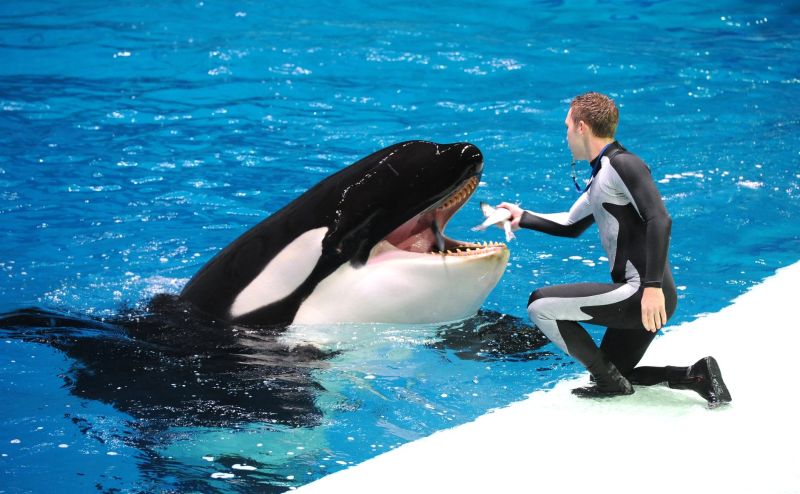
Photo by Moskvarium
Narnia’s life in captivity began on August 11, 2012, when she was captured from the Okhotsk Sea at just six years old. The operation, described as violent and traumatic, led to the deaths of two of her pod members—one drowned in nets while another was shot. Her capture marked a significant moment in Russian history as the first successful live capture of an orca, setting a precedent for similar operations in the years to follow.
Following her capture, Narnia was taken to the TINRO Center, where she was forced to adapt to eating dead fish, a far cry from her natural diet of marine mammals as a transient orca. She also endured training for performances. After nearly a year in isolation, she was joined by three other wild-caught orcas—Nord, Grace, and Orpheus—who were also unfamiliar with captivity. Remarkably, Narnia taught them to eat dead fish, a tragic testament to her adaptability under unnatural conditions.
In late 2013, Narnia and Nord were transferred to Moscow and later moved to Moskvarium, where they were joined by another captive orca, Naja. Moskvarium opened its doors to the public in 2015, becoming Narnia’s permanent home.
Narnia spent over a decade in captivity, performing for audiences in an environment far removed from her natural habitat. Her story underscores the ongoing debate over the ethics of keeping marine mammals in captivity.
Her passing is a poignant reminder of the sacrifices made by animals in the name of entertainment.
Rest in peace, Narnia.